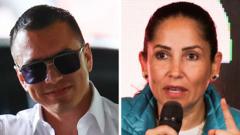Ecuador's recent presidential election has culminated in a "technical tie," with incumbent Daniel Noboa and his opponent Luisa González receiving nearly identical vote shares, thus failing to provide a clear victor. Election authorities announced that the close result warrants a run-off in April, raising concerns about electoral polarization in a country already grappling with political and social strife.
The outcome was surprising, with earlier polls showing Noboa in a seemingly strong position but ultimately leading to disappointment among his supporters. Many gathered in Quito, excitedly adorned with Noboa’s campaign paraphernalia like flags and life-sized cutouts that have become iconic throughout the region. They believe he represents a stabilizing force against the backdrop of rampant gang violence that has plagued Ecuador during his presidency.
With a heavy focus on creating security through military initiatives, Noboa's support remains strong among those pleased with his efforts to address violent crime, yet challenges remain. Critics, including González, have highlighted economic stagnation, rising costs of fuel, and inadequacies in dealing with enduring violence.
As the race advances, González, aligned with populist ideologies of former president Rafael Correa, poses a significant challenge. She critiques Noboa for his inability to fulfill economic promises and emphasizes a socioeconomic approach to combat crime, drawing support from citizens seeking change and expressing frustration with the current administration.
However, not all voters are convinced by either candidate; some express discontent with the electoral process itself, feeling trapped between two unsatisfactory options. As social inequities and issues of security dominate the electoral landscape, whoever prevails in April will inherit a host of pressing crises, including organized crime and economic stability.
In summary, Ecuador's political landscape stands on the brink of major change, revealing deep divisions among citizens and offering a vivid glimpse into the complex social fabric shaping the nation's future.




















